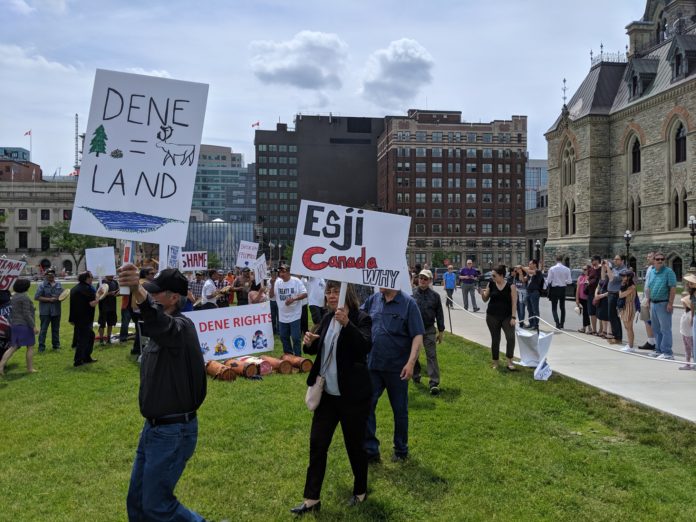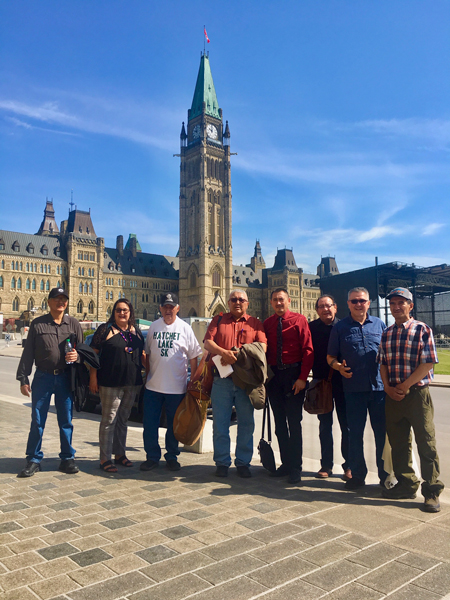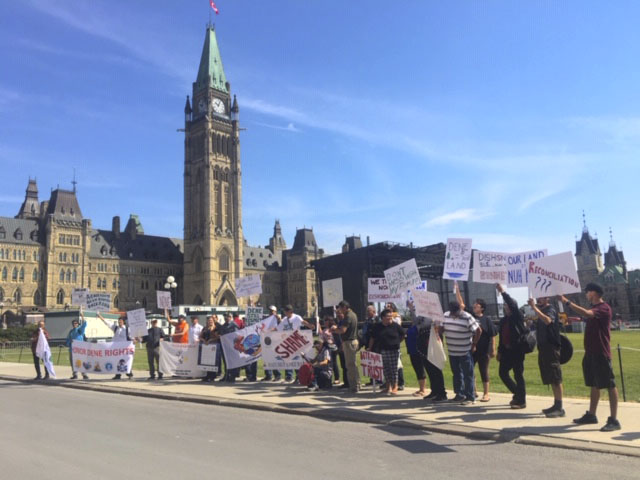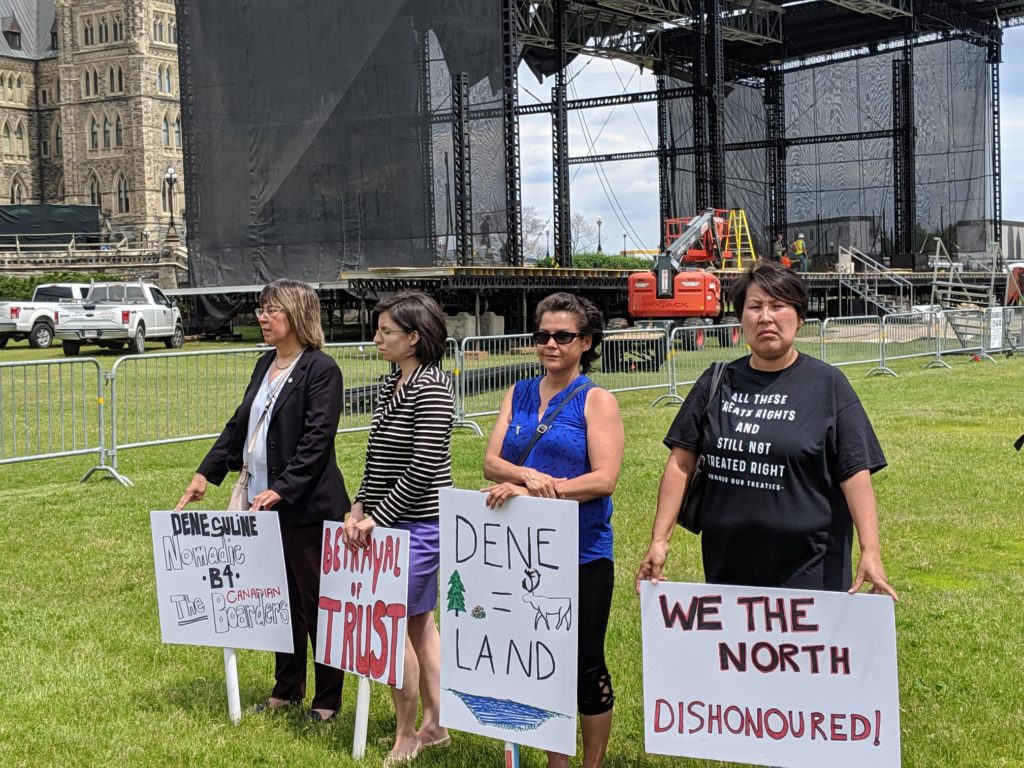
A group of Denesuline communities that had been negotiating a land settlement agreement is accusing the federal government of backing out of the deal at the 11th hour.
Five Denesuline communities, including the Athabasca Dene of Black Lake, Fond Du Lac and Hatchet Lake, as well as the Northlands Denesuline and the Sayisi Dene First Nations of Manitoba, say they were on the verge of finalizing land claim agreements they’ve been negotiating for 18 years. The agreement would recognize their rights within traditional territories in Nunavut and the Northwest Territories.
The agreement is called the North of 60 Final Agreement, referring to the 60th parallel, making up the northernmost border of Manitoba and Saskatchewan.
Negotiations started as the result of a pair of court cases launched in 1991 and 1993 alleging that Denesuline were left out of land use negotiations when the territory of Nunavut was created. Discussions about the land in question, known as Nuhenéné, though, have taken place since at least the 1970s, the group says. Neither the Athabasca nor Manitoba Dene had been included in those discussions.
According to a press release signed by the Prince Albert Grand Council, Federation of Sovereign Indigenous Nations and Assembly of First Nations, research and investigations teams have worked to document the history, mapping and analysis to demonstrate the natural territory of the Denesuline located near the territorial border.
The group of Denesuline nations and negotiators say they were promised verbally and in writing that an agreement would be initialled now. They said the understanding was ratification work would begin in Dene communities while consultation with other impacted Indigenous groups would continue. The group of Dene nations said they were willing to further adjust the language in the agreement to address any further concerns from other impacted Indigenous groups who also use the land.
Concerns have been raised by Métis groups, they said. The group of Dene communities has signed a memorandum of understanding with the Inuit and addressed those concerns at the negotiating table, chief negotiator Ron Robillard told reporters Wendesday.
Leaders from five communities from northern Saskatchewan and Manitoba, as well as negotiators and other supporters, held a press conference and demonstration on Parliament Hill Wednesday calling on Crown Indigenous Relations Minister Carolyn Bennett to explain why the government backed out.

According to Robillard, who has been working on the file for the last 18 years, he was travelling to Yellowknife with other negotiators to initial maps recognizing portions of territory in NWT and Nunavut as traditional territory of the Dene when he received an email that the government was not prepared to initial the maps until further notice.
The group then received a letter from Bennett that her commitment to initialling the agreement was “deferred until further notice,” without any explanation. Then, he said, the federal government’s negotiator indicated that all scheduled negotiation meetings were cancelled until further notice.
The official reason given was that consultations with other groups had to continue.
Robillard explained his frustration.
“We have been at this for the past 18 years – more than 25 years of lobbying and court action,” he said.
“Finally, we thought we were going to see the light to reach a final agreement. They gave us hope. Now, all of that is uncertain. People were excited. I have to go back and tell my people we have been betrayed.”
He stressed that the land in question wasn’t just used historically. He said that Dene people use it to this day, and the recognition would enshrine their land use rights in a legal agreement, supporting their rights to harvest, fish and trap in the territories. It will include provisions on wildlife harvesting, resource management, land claim settlement area, hunter/trapper organizations and other rights and benefits.
Robillard said that consultations have been ongoing since 2016 with concerned Indigenous groups in an effort to find a solution that worked for everyone.
“The minister made a commitment saying that even though consultations are ongoing, we will commit to initial the agreement,” Robillard said.
“We have no idea (what the concerns are). We have been working to address any issues that might arise. We felt like all their concerns were addressed and the issues brought forward were accommodated. We even changed some of the draft wording in our agreement. We thought everything was settled. We do not have any idea why the minister pulled a plug with us.”
Simon Denechezhe, the chief of Northlands Dene First Nation in northwest Manitoba, rejected the notion that consultations could be a reason for the federal government to walk away from negotiations.
“We are not opposed to consultation and never have been,” he said.
“For the minister to blame consultation for stopping our deal is not right. It is not in the spirit of good faith negotiations and reconciliation. We had an agreement that our deal would go forward while consultation was going on. Our people have been fighting for decades to have our rights recognized.”
Louie Mercredi, the chief of Fond Du Lac Dene Nation, also had strong words for Bennett.
“It is strange to negotiate for something that has been ours for so many years,” he said.
“We lived, loved and have buried here and will continue to do so. Our land and the caribou make us Denesuline. These agreements are a way to protect our way of life. When Minister Bennett broke her promise …. I feel the government is saying that we are not people.
“I urge Minister Bennett to do the right thing, to reverse her decisions, to initial the agreement and let us proceed with the ratification. Anything less is dishonourable.”
The northern chiefs were hoping they would receive an audience with Minister Bennett and the Prime Minister during their visit in a bid to reopen negotiations. Failing that, the group said they will have to consider their next move.
One possible step could be restarting the court case that initiated negotiations in the first place.

Federal NDP, First Nations groups backing Dene communities
The Federal NDP and leadership from the Prince Albert Grand Council, The Federation of Sovereign Indigenous Nations and the Assembly of First Nations all issued statements in support of the Dene communities negotiating the North of 60 agreement.
PAGC vice chief Joseph Tsannie has been involved in the negotiations since 1996 as a band councillor. According to a press release, he has continued to show support politically and financially at the PAGC level.
“This issue has been important to our Dene communities, especially our Elders – many who have passed on, for as long as I can remember. We were under the impression that we had fulfilled the needed requirements and had been negotiating in good faith. That is why this announcement came as a surprise,” he said in a written statement.
“We did not receive any advance notice that this decision was going to be made. In fact, it was only last week that we found out that this was not going anywhere and has come to a halt. That’s why it was important for a delegation of us come to Ottawa to demand to sit down with Minister Carolyn Bennett with the hopes that this government will ultimately finalize this agreement.”
Two NDP MPs — Niki Ashton from northern Manitoba and Georgina Jolibois from northern Saskatchewan, stood alongside the Dene leaders during Wednesday’s press conference and during their demonstration on Parliament Hill.

“What we heard this morning is that Minsiter Bennett and Prime Minister Trudeau are not holding their commitment and they’re not being honest and truthful,” Jolibois said.
“I’m asking the Prime Minister of Canada and Minister Bennett to continue to resume negotiations with the group who are here today. I’m asking them in good faith. The chiefs from a remote area have travelled long hours to be here. It’s really important.”
“We’re here to support their call for justice,” Ashton added.
“For decades they have been fighting this fight. We share not just their disappointment, but frankly their outrage.”
Bennett, Trudeau defend decision in question period
Tuesday during question period, Ashton questioned Bennett on why the federal government had decided not to initial the agreement.
“The relationship with First Nations, Métis and Inuit is the most important relationship,” Bennett said.
“It is therefore extraordinarily important that in any decision we made the Section 35 rights holders are consulted. There have been discussions and concerns raised by Indigenous peoples in the Northwest Territories, and until I feel those consultations are met to my satisfaction, we will have to delay the initialling of that agreement.”
Wednesday, Jolibois followed up with a question of her own. It was answered by Trudeau.
“No relationship is more important to Canada than the one with Indigenous peoples,” he said, according to CBC News.
“We have a responsibility to meaningfully consult with communities in order to understand, work through the issues that they have brought forward.”
The Daily Herald sent the Ministry of Crown Indigenous Relations a list of questions. A written response was received June 21.
“No relationship is more important to Canada than the one with Indigenous Peoples, and we are committed to renewing that relationship on the basis of the affirmation and implementation of rights, respect, cooperation and partnership,” Minister Bennett’s office said.
“Concerns have been raised by Indigenous groups in the Northwest Territories about the terms of the draft agreement and the impact on their communities and rights. We have a responsibility to meaningfully consult with these communities in order to understand and work through the issues they have brought forward.”
** This story was updated on June 21, 2019 to add comment from Minister Bennett’s office.

